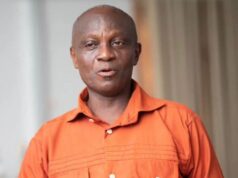Two lecturers of the University of Ghana who were accused of soliciting sex in order to extend some advantages to female students in a documentary by the British Broadcasting Corporation (BBC) have been cleared of any act of sexual misconduct by the fact-finding committee set up by the university.
The lecturers, Prof. Ransford Gyampoh and Dr Paul Kwame Butakor, were, however, found culpable of conducting themselves in a manner that caused embarrassment to the university, for which reason the committee advised the university authorities to refer them to the university’s disciplinary committee for appropriate action.
“The committee finds that on the totality of the evidence before it, there is a huge variance between the import of the title: ‘Sex for grades’, and the content of the actual secret video recording of the affected lecturers of the University of Ghana,” it said.
The report was presented by the committee to the university authorities in November 2019, but the details were not made public.
On November 20, 2019, the university, in a statement, said the two lecturers had been referred to the disciplinary committee, but the committee is yet to make a determination
No evidence
On the issue of sexual misconduct, the six-member fact-finding committee reached the conclusion that there was no evidence from the BBC documentary which proved any act of sexual misconduct on the part of the lecturers within the context of the university’s regulations.
“The committee notes that neither the documentary nor the BBC has provided any evidence to demonstrate that the affected lecturers demanded sex in exchange for grades, as asserted by the title of the documentary: ‘Sex for grades’,” the report stated.
It further noted that the title of the documentary was sensational and misleading.
Explaining its findings, the committee said per paragraphs 10.1, 12.1 and 12.4 of the Code of Conduct for Academic Staff and the Anti-Sexual Harassment and Misconduct Policy of the university, a victim of sexual misconduct must be a member of the university.
However, the evidence on record showed that the two alleged victims in the video — Zara and Abigail — were not members of the university.
“Consequently, the committee notes that in the absence of any evidence that Zara and Abigail are students or members of the University of Ghana, the provisions of paragraphs 10.1, 12.1 and 12.4 of the Code of Conduct for Senior Members of the University of Ghana and the Anti-Sexual Harassment and Misconduct Policy of the university cannot be triggered against the affected lecturers,” it said.
What the law says
Paragraph 10.1 of the Code of Conduct for Academic Staff of the University of Ghana stipulates: “Academic staff shall refrain from any type of harassment or discrimination against students and shall adhere to the Anti-Sexual Harassment Policy of the university.”
Paragraph 12.1 of the code says: “Academic staff are prohibited from engaging in sexual or amorous behaviour with students,” while Paragraph 12. 4 says: “Academic staff are bound by the Anti-Sexual Harassment Policy of the university.”
Inappropriate behaviour
On the issue of inappropriate behaviour and why the two lecturers should be referred to the university’s disciplinary committee, the report said Prof. Gyampoh and Dr Butakor breached Paragraph 6.4 of the Code of Conduct.
It said the action of the two lecturers in the said video did not promote the image of the university and, therefore, they ought to be hauled before the disciplinary committee.
“On the totality of the evidence before the committee, we find credible evidence that the conduct of Prof. Gyampoh and Dr Butakor was damaging and caused embarrassment to the university. By their conduct, they failed or neglected to comport themselves in ways that will enhance their image and that of the university.
“It is, therefore, the view of the committee that there is credible evidence to support the conclusion that the conduct of Prof. Gyampo and Dr Butakor appears to breach Paragraph 6.4 of the Code of Conduct for Senior Members of the University of Ghana,” it added.
Paragraph 6.4 of the Code of Conduct for Academic Staff of the university stipulates: “Academic staff shall, at all times, comport themselves in ways that will enhance their image and that of the University.”
The committee further found Prof. Gyampoh’s remarks in the video, including the now infamous “Have you been violently kissed before?”, a vexatious conduct against Abigail, the undercover journalist in the documentary.
According to the committee, that comment and other remarks by Prof. Gyampoh were vexatious and a clear breach of Statute 42 (1) (e) (i) of the University of Ghana Statutes, which were known as the basic laws of the university.
It established that violation of the said statutes was applicable to everyone, irrespective of whether or not the victim was a member of the university community.
Documentary and committee
On October 7, 2019, the BBC aired a documentary with the title ‘Sex for grades’ which accused some lecturers in certain African universities, including the University of Ghana, of sexual harassment and misconduct.
Prof. Gyampoh of the Political Science Department of the University of Ghana, who is also the Director of the Centre for European Studies of the university, and Dr Butakor, a Senior Lecturer at the School of Education, were allegedly captured in the video and accused of offering grades for sex.
Following the documentary, the Vice-Chancellor of the university, Prof. Ebenezer Oduro Owusu, set up a fact-finding committee to investigate the alleged sexual misconduct by the two lecturers.
Per its terms of reference, the committee was tasked to ascertain whether or not the actions of the lecturers constituted acts of sexual harassment and/or misconduct, with reference to the university’s policy.
It was also required to find out whether or not the two lecturers breached the conditions of service of senior members and also find out if the actions of the lecturers had brought the name of the university into disrepute.
The committee was chaired by Justice Vida Akoto-Bamfo, a retired Justice of the Supreme Court, with Professor Charlotte Wrigley-Asante, Prof. Michael P.K. Okyerefo, Dr Abdul Baasit Aziz Bamba, Ms Doris Ansah and Mr W.N. Torvinyo as members.
By: Graphic.com.gh























